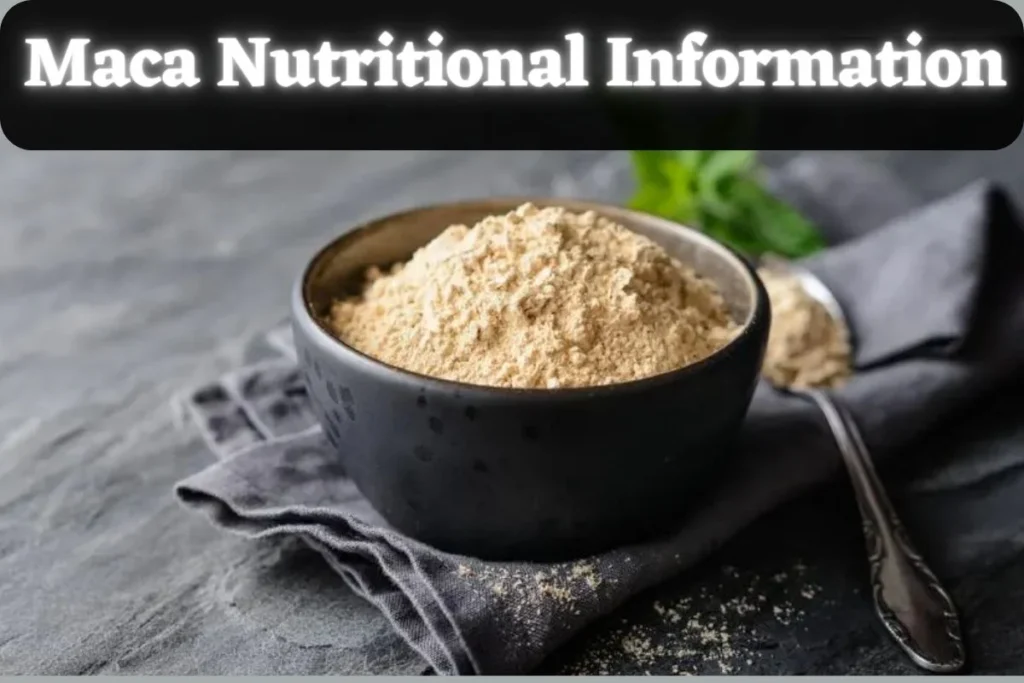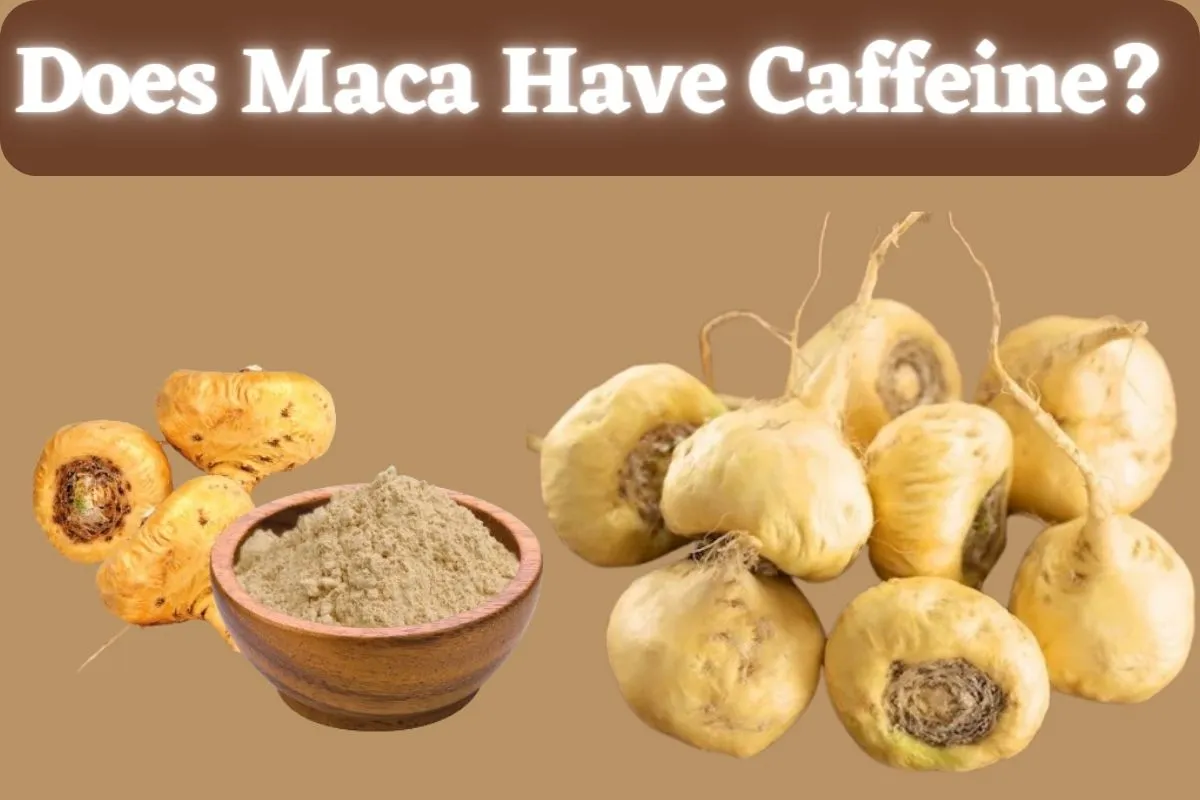Maca, a root vegetable native to Peru, has gained popularity worldwide for its potential health benefits. Maca, sometimes referred to as a “superfood,” is well known for its capacity to improve mood, increase energy, and maintain hormonal balance.
However, amidst the buzz surrounding this ancient plant, questions arise regarding its caffeine content and its implications for those sensitive to caffeine. We’ll explore the intriguing topic of Does Maca Have Caffeine? in this article.
Importance of Knowing Caffeine Content in Maca
Maca is a herbaceous plant is native to the central Andes of Peru. It’s often referred to as Peruvian ginseng due to its purported health benefits, especially as an aphrodisiac and fertility enhancer. It is consumed in powdered form, added to smoothies, beverages, or used in baking.
Given the growing popularity of maca root worldwide for its potential health benefits, understanding its relationship with caffeine is important.
It’s a common misconception that maca provides a caffeine-like energy boost. However, in reality, its energizing effects come from a unique blend of nutrients, vitamins, and minerals that support the body’s natural energy production; not caffeine.
Individuals who should generally be cautious or avoid maca consumption, especially in concentrated forms, include those who are pregnant or breastfeeding, have thyroid conditions, or are taking medications that could interact with maca. If you have concerns, it’s always best to consult with your doctor before adding maca to your diet.
Does Maca Have Caffeine?
No, pure maca root, a Peruvian superfood derived from a plant in the cruciferous family, is naturally caffeine-free. Unlike coffee beans or tea leaves, maca doesn’t contain the stimulant responsible for that familiar caffeine buzz.
So why does maca have a reputation for boosting energy? It’s because this root vegetable is packed with vitamins, minerals, and unique compounds called macamides. These nutrients work together to support your body’s natural energy production processes, potentially leading to increased stamina and reduced fatigue.
However, it’s important to be aware that products labeled “maca coffee” or similar blends can contain caffeine because they are mixed with coffee beans. The caffeine content in these products can vary depending on the ratio of coffee to maca. Therefore, reading labels carefully is crucial, especially for those sensitive to caffeine or with underlying health conditions.
Maca Variants and their Caffeine Content
Maca is categorized primarily by its root color: cream-yellow, red, purple (sometimes referred to as black), and less commonly, green.
Each type of maca is believed to offer distinct health benefits, attributed to its unique nutritional and phytochemical profiles. However, it’s crucial to note that all types of maca share a common characteristic: they are naturally caffeine-free.
Cream-yellow maca:
This is the most widely cultivated and available variety of maca. It is often recommended for general health maintenance, energy boosting, and mental clarity.
Red maca:
Red maca is known for its potential benefits in balancing hormones and improving bone density. Some studies suggest that it may have a positive effect on prostate health.
Black maca:
Considered by some as the rarest and most valuable type, black maca is often associated with improved memory, increased stamina, and enhanced libido. Research has also indicated its potential in supporting mood and cognitive function.
Green maca:
Less common than the other varieties, green maca is not as extensively studied or marketed but is also used for its health-promoting properties.
List of Ingredients in Maca
Maca root is particularly noted for its unique composition that includes a wide range of bioactive compounds and essential nutrients which contribute to its numerous health benefits. Here is a list of some key ingredients found in maca:
- Macronutrients: Maca is a good source of carbohydrates and dietary fiber, which are important for energy and digestive health. It also contains a moderate amount of protein.
- Vitamins: Maca contains several vitamins such as vitamin C (important for the immune system and skin health), vitamin B6 (crucial for brain development and function), and niacin (beneficial for B3, which is important for converting food into energy).
- Minerals: The root is rich in minerals including iron (essential for blood health), potassium (important for heart and muscular function), copper (necessary for red blood cell production), magnesium (crucial for many body processes including muscle and nerve function, blood glucose control, and bone health), and zinc (important for immunity, DNA synthesis, and cell division).
- Fatty Acids: Maca contains linolenic acid, palmitic acid, and oleic acid, which are beneficial fats that contribute to its anti-inflammatory properties.
- Amino Acids: It provides 19 amino acids, which are the building blocks of proteins and play critical roles in processes such as neurotransmitter transport and biosynthesis.
- Glucosinolates: These are sulfur-containing compounds found in maca, similar to those in broccoli and kale, known for their potential anti-cancer properties.
- Phytonutrients: Maca is rich in plant compounds that have antioxidant properties, such as flavonoids and polyphenols, which may help protect against chronic diseases.
- Macaenes and macamides: Unique bioactive compounds that are believed to contribute directly to the reputed energy-boosting and libido-enhancing properties of maca.
Maca Nutritional Information

A serving of maca provides a modest 18 calories and is almost entirely fat-free, making it a low-calorie food option. It offers 4.2 grams of total carbohydrates, including a small amount of dietary fiber (0.3 grams).
While it contains a negligible amount of sugar (0.2 grams), it does provide a small amount of protein (0.4 grams).
In terms of micronutrients, maca contains trace amounts of vitamin D, moderate levels of calcium (3.3mg), a small amount of iron (0.1mg), and a bit of potassium (50.1mg). Importantly, maca is naturally caffeine-free.
| Nutrient | Amount Per Serving |
| Calories | 18 |
| Total Fat | 0g (0%) |
| – Saturated Fat | 0g (0%) |
| – Trans Fat | 0g |
| – Polyunsaturated Fat | 0g |
| – Monounsaturated Fat | 0g |
| Cholesterol | 0mg (0%) |
| Sodium | 2.8mg (0%) |
| Total Carbohydrates | 4.2g (2%) |
| – Dietary Fiber | 0.3g (1%) |
| – Sugars | 0.2g |
| Protein | 0.4g |
| Vitamin D | 0mcg (0%) |
| Calcium | 3.3mg (0%) |
| Iron | 0.1mg (0%) |
| Potassium | 50.1mg (1%) |
| Caffeine | 0mg |
Alternatives to Maca and their Caffeine Content
When considering alternatives to maca for energy, libido enhancement, or hormonal balance without the caffeine content, there are several natural supplements and foods to consider. Each comes with its unique nutritional profile and health benefits:
Ginseng:
Often used for its potential to boost energy levels and improve cognitive function. Ginseng does not contain caffeine, making it a suitable energizer for those avoiding stimulants.
Ashwagandha:
An adaptogen like maca, ashwagandha is known for its ability to reduce stress, improve stamina, and enhance overall vitality. It’s caffeine-free and has been used traditionally in Ayurvedic medicine.
Rhodiola Rosea:
Another adaptogenic herb that helps the body adapt to and resist physical, chemical, and environmental stress. Rhodiola is used for increasing energy, stamina, strength, and mental capacity. It does not contain caffeine.
Spirulina:
A type of blue-green algae that’s packed with nutrients. It’s a source of protein, vitamins, minerals, and antioxidants but does not contain caffeine. Spirulina can boost energy levels due to its high nutrient density.
Cordyceps:
A type of mushroom that has traditionally been used in Chinese medicine to boost energy and improve sports performance. Cordyceps do not contain caffeine and are favored for their energy-enhancing properties.
Beetroot Powder:
Rich in nitrates, beetroot powder can improve blood flow and increase physical performance. It’s often used by athletes to boost endurance and performance without the need for caffeine.
Chia Seeds:
These seeds are a good source of omega-3 fatty acids, fiber, antioxidants, iron, and calcium. While not a direct alternative to maca, chia seeds can provide sustained energy without caffeine due to their high nutritional value.
Matcha:
While matcha does contain caffeine, the levels are typically lower than in coffee. Additionally, matcha provides a unique set of antioxidants known as catechins. For those who can tolerate small amounts of caffeine, matcha offers a more balanced energy boost compared to coffee.
| Alternative | Caffeine Content |
| Ginseng | Caffeine-free |
| Ashwagandha | Caffeine-free |
| Rhodiola Rosea | Caffeine-free |
| Spirulina | Caffeine-free |
| Cordyceps | Caffeine-free |
| Beetroot Powder | Caffeine-free |
| Chia Seeds | Caffeine-free |
| Matcha | Approx. 35 mg per gram |
Conclusion
Does Maca Have Caffeine? It’s important to remember that pure maca root is naturally caffeine-free. This superfood offers a distinct energy boost derived from its nutrient-rich profile and unique compounds. However, always be mindful of “maca coffee” or similar blends, as these often incorporate regular coffee beans and therefore contain caffeine.
Whether you’re seeking a caffeine-free alternative to coffee or simply want to bolster your daily nutrition, pure maca root offers a compelling choice. As always, consult with your doctor before adding maca to your diet, especially if you have any health concerns.
Frequently Asked Questions
Q1. Who should not take maca?
Individuals with thyroid conditions, pregnant or breastfeeding women, and those on hormone-sensitive medications should consult their doctor before using maca. It’s best to exercise caution due to the potential impact maca can have on hormone levels.
Q2. Is it bad to eat maca every day?
Consuming maca in moderation is generally considered safe when consumed in food amounts or in doses up to 3 grams daily for up to 4 months. However, for optimal use, some experts recommend cycling maca intake or taking breaks to prevent your body from building up a tolerance.
Q3. Is it better to take maca powder or capsules?
Both forms are effective. Powder offers versatility for adding to smoothies and foods, while capsules provide a convenient and pre-measured dose. Choose the form that best suits your preferences.
Q4. How quickly does maca work?
Results from maca are not immediate. You might notice subtle changes within a few weeks of consistent use, but more significant benefits often take longer to manifest.
Q5. What are the side effects of maca root?
While generally well-tolerated, some people might experience mild side effects like digestive upset, mood swings, or sleep disturbances. If you encounter any adverse effects, it’s best to reduce your dosage or stop taking maca altogether.

Rossi Glover, the passionate Owner of Grand Lake Coffee, infuses every cup with her love for coffee and dedication to quality. With an extensive background in the art and science of coffee, Rossi is not just a connoisseur but a storyteller, sharing the intricate tales behind each brew.

